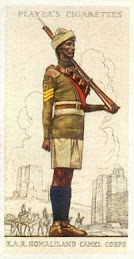He decided to counter-attack and led his men down the hill in a fierce bayonet charge. After being wounded in the shoulder, he stuffed his arm into his belt to stop it flopping about and continued to lead the attack.
The Italian forces broke and fled, and many of their native levies were shot down by Black Shirts who had been waiting at their rear. The Highlanders pursued the enemy for a mile and left them so demoralised that they offered no further interference to the battalion's withdrawal under cover of darkness. Rose was awarded his first DSO, at that time an unusual award for a junior officer.
David MacNeil Campbell Rose, the son of Brigadier John Rose, was born at Alverstoke, Hampshire, on March 23 1912. His three brothers had distinguished careers in the Army in the Second World War; two of them were highly decorated.
After Glenalmond and Sandhurst, David was commissioned into the Black Watch. Army service in Scotland included a period spent on the Royal Guard at Balmoral. King George V was Colonel-in-Chief of the Black Watch and nearing the end of his reign. On one occasion, at the Ghillies' Ball, he discovered Rose and a fellow officer helping themselves to a bottle of champagne which had been specially left out for himself.
As a "punishment" he ordered both young officers to dance with the Queen and then come shooting with him the next day. During the shoot, Rose's overenthusiastic dog retrieved a grouse from immediately behind the King's butt.
"My bird I think, Rose!" said the King.
Not wishing to be deprived of one of his small bag, and aware that the King was very proud of being a superb shot, Rose, in some trepidation, replied: "No, Sir, it must be one of mine. It's a runner!"
After a snort, the gruff reply came back: "Proper little courtier, aren't you, Rose? All right. I suppose you can count it as one of yours!"
In 1938, 1 BW was deployed to Palestine. The troopship docked at Tangiers, allowing time for a run ashore. While visiting the souk, Rose was astonished to recognise his youngest brother dressed as an Arab and begging. The young man subsequently joined the Foreign Legion and was awarded the Croix de Guerre and Médaille Militaire.
After his exploits in British Somaliland, Rose attended Staff College in Haifa. But soon after taking up his first staff appointment in Cairo, 2 BW urgently needed reinforcements following its attempt to break out from Tobruk, and he returned to the battalion as adjutant.
Rose was subsequently posted to Burma to command one of the two Black Watch columns in the second Chindit campaign. There he was wounded again in the shoulder, but managed to continue in command behind Japanese lines for some weeks before severe blood poisoning forced his evacuation and a long period of convalescence.
After a spell on a military mission in Cairo and a posting to Tripoli as brigade major, he was recalled from commanding the regimental depot in Perth to take command of 1 BW shortly before its departure for Korea in June 1952.
That autumn the battalion took over defence of "The Hook", a prominent salient dominating the Samichon river valley. With the help of the Royal Engineers, deep tunnels were excavated in each company position to provide protection from bombardments and allow the soldiers to take cover if they were overrun. Rose was able to call for airburst shelling to be brought down on his own positions to break up enemy attacks before clearing the trenches by bayonet.
On November 18 and 19, 1 BW was subjected to repeated assaults from two Chinese battalions. On the first night, when they came under heavy bombardment, Rose was never out of touch with his forward platoons. The Hook was held and the Chinese suffered large losses. In recognition of his outstanding leadership, Rose was awarded a Bar to his DSO.
In August 1953 he took the battalion to Kenya to help suppress the Mau Mau uprising. On returning to England, he went to the small arms school as chief instructor.
He retired from the Army in 1958 and, having settled in Perthshire, enjoyed shooting and fishing and creating a garden.
David Rose died on October 24. He married, in 1945, Lady Jean Ramsay, younger daughter of the Earl of Dalhousie. She predeceased him, and he is survived by their son and daughter.
http://www.telegraph.co.uk/news/obituaries/military-obituaries/army-obituaries/8088407/Lieutenant-Colonel-David-Rose.html



.png)



